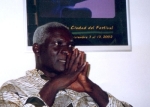Olaf M??ller, for Isola Cinema
 Roger Gnoan M’Bala, famous for his social satires, once said – but does he still believe it, does it still work like that? Gnoan – born in 1943 in Grand Bassam; educated in the craft of directing in France and Sweden – belongs, together with the late and production-wise sadly marginal Etienne N’Dabian Vodio, to the second generation of filmmakers from the Ivory Coast.
Roger Gnoan M’Bala, famous for his social satires, once said – but does he still believe it, does it still work like that? Gnoan – born in 1943 in Grand Bassam; educated in the craft of directing in France and Sweden – belongs, together with the late and production-wise sadly marginal Etienne N’Dabian Vodio, to the second generation of filmmakers from the Ivory Coast.
When he entered the scene in 1970 with Koundoum – a short documentary about a dance ritual from Grand Bassam –, three major auteurs, Timite Bassori, Desire Ecare, and Henri Duparc, had already, with only a mighty fistful of films, established a certain local style of filmmaking: Cautiously cosmopolitan and guardedly modern, with always a certain casually caustic edge – the Ivory Coast was once considered to be something like the most ‘European’ of all African countries, whatever that might mean and good that might do, their films seem to ask…; of these three founding masters, only Duparc was in the end able to build a more massive oeuvre – Timite became an administrator in the mid-70s while Ecare got lost for something like 15 years in the making of his chef d’oeuvre, Visage de femmes (1985).
After Koundoum, Gnoan got a job with the national television which produced his next films. It’s the half hour-TV-short Amanie (1972) which gives a first inclination of the shape of all the things Gnoan’ian to come: The tale of a huckster from the hinterland hitting the capital of Abidjan, making just a fine mess that exposes a certain shallowness here and a good deal of vanity there, until he finally vanishes back to the country side. The short Gboundo (1973), the medium-length Le chapeau (1976), and, after a nine-year-hiatus, the feature-length Ablakon (1984) follow in a similar way with tales of con artists turning occasionally and just by default into society’s court jesters.
With Bouka (1988), Gnoan’s filmmaking turns towards a different subject: He starts to contemplate the influence of Western on the local culture/s. Bouka as well as Au nome du Christ (1993), his probably most celebrated work, both deal with the battle between Christian and traditional local values, while his last work to date, Adanggaman (1999), is a fury-filled epic on the history of slavery and the collaboration of Africans in selling their own peoples. It’s probably a sign of the times changing for the worse that Gnoan feels the need to consider things in a more historical-global way: to remember.





